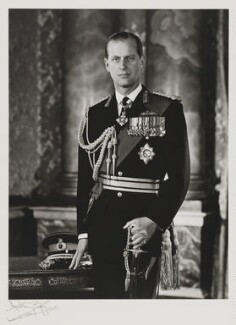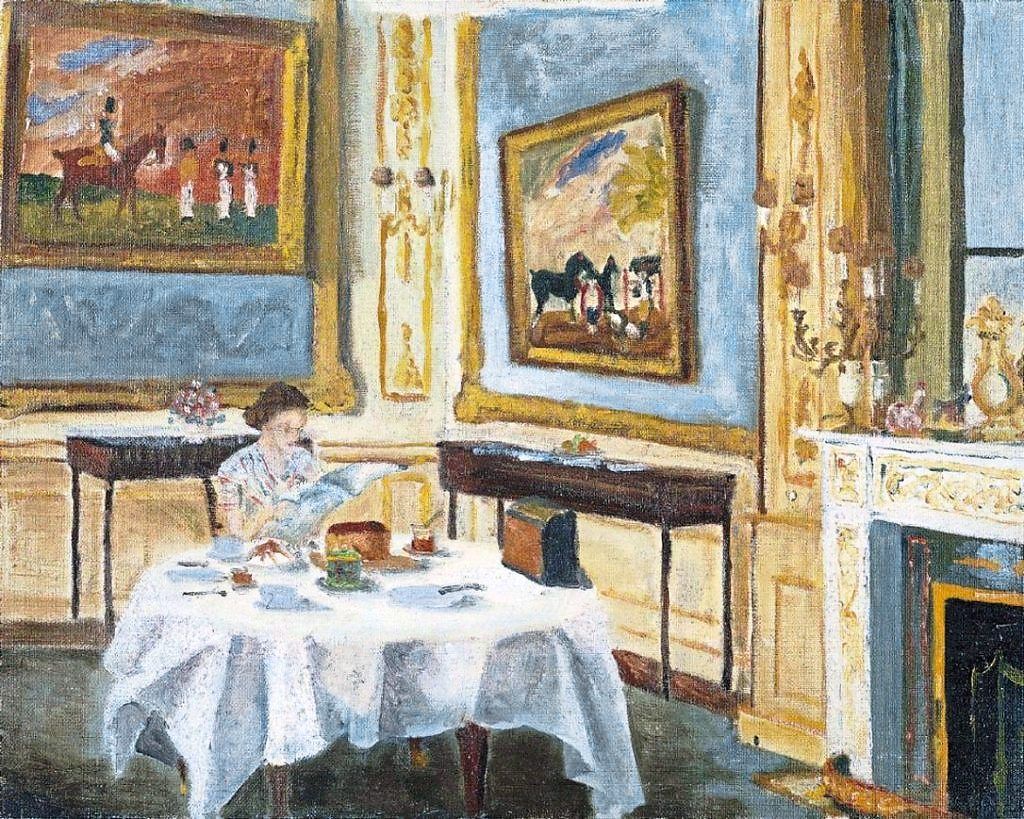In the words of the Poet Laureate Simon Armitage’s in his Elegy – The Patriarchs :
The weather in the window this morning is snow,
unseasonal singular flakes,
a slow winter’s final shiver.
On such an occasion to presume to eulogise one man
is to pipe up for a whole generation.
…Husbands to duty…
But for now a cold April’s closing moment…
On the 9th of April 2021, Prince Philip, Duke of Edinburgh, Prince of Greece and Denmark, Queen Elizabeth II’s consort for 73 years, drew his last breath aged 99 years old.

Prince Phiiip, Duke of Edinburgh, 1964, The National Portrait Gallery
A door was closing on Europe and England’s past, as one of the most famous witness and protagonist of the twentieth century’s turbulent and tormented history had gone, a cycle was ending. It was poignantly brought to bear this Saturday 17th of April 2021, at the St George’s Chapel at Windsor Castle, when the small and frail black-clad figure of the Queen walked out alone of the funeral ceremony, having laid to rest her Beloved husband, with whom she had shared all of her reign, leaving a letter on his coffin signed Lilibeth.
This man was a born leader, strong in mind and body, made to rule, Prince Philip, wrote his teacher and mentor Kurt Hahn, will make his mark in any profession where he will have to prove himself in a trial of strength, a Royal Prince of Greece and Denmark who chose for the love of a woman to remain in her shadow and to serve both his Queen and her country, which became his.
He was born in a privileged world still steeped in the 19th century, yet his world was shattered as a babe, and when his family was made exiled and destitute, after a loving infancy he knew solitude and poverty. His life circumstances taught him early self-reliance, and it was reinforced by his Spartan upbringing under the guidance of the educational pioneer Kurt Hahn at Schule Schloss Salem in southern Germany, then at Gordonstoun in Scotland, where Hahn as a Jew had to flee from the Nazis.
Prince Philip was a stoic, Mens sana in corpore sano, which he expressed in a speech in 1958 in Ghana : The essence of freedom, is discipline and self-control. Princess Elizabeth’s accession to the throne in 1952 meant the end of all his personal ambitions as a naval commanding officer in Malta. He would have to let go of his first love, the sea: It is an extraordinary master or mistress, it has such extraordinary moods, and of the privacy of his married life. From then onwards his life would be public, at the service of the Queen and of England. By Royal Warrant he would have precedence after the Queen in all occasions, but no constitutional role.
At first he threw himself in a very active social life. His task as Prince Consort was not an easy one, his foreign origins, half German from his mother, his lack of fortune, his strong virile personality used to command, clashed in the hushed, privileged atmosphere of the English Court. His aura was that of a dashing adventurer not of a subservient cautious courtier. His equerry recalled: Philip was constantly being squashed, snubbed, ticked off, rapped over the knuckles… I felt Philip did not have any friends or helpers. Yet he learnt to channel his creative energies in the defence of the principles inherent to his nature and enforced by his education, with honour and steadfastness, never looking back : There’s never been ‘if only » except perhaps that I regret not having been able to continue a career in the navy. His philosophy of life was thus resumed: The ability we have as humans to make our own moral and ethical decisions.
Beside his constant presence at the Queen’s side in her official engagements, state visits and world tours, spurred on by a high moral sense, he dedicated his life to causes close to his heart. His concern for the welfare of young people led in 1956 to the creation of the Duke of Edinburgh’s Award, on the educational lines of his own mentor Kurt Hahn: community service, teamwork, responsibility and respect for the individual. He explained it to the BBC: If you can get young people to succeed in any area of activity that sensation of success will spread over into a lot of others. It encapsulated all his own beliefs and life experience in allowing young people the world over to involve themselves physically, mentally and emotionally in a range of outdoor activities designed to promote a sense of self-reliance, developed team work and respect for nature. Over six millions 15 to 25 years old, some disabled, benefited from it over the years.
He was himself a great sportsman: he sailed, learnt to fly, swam and rowed, rode horses and drove carriages, he was President of the International Equestrian Federation, played polo, cricket and squash. He developed hundred of projects and patronages in relation to the education of youth, sports and the outdoors. He had a relationship to nature as a country born responsible gentleman farmer, fishing, shooting and stalking with a sense of preservation. He expressed it on the BBC: I think it’s marvellous we have such a fantastic variety of life on this planet, all interdependent, I think also that if we humans have the power of life or death – or extinction or survival – we ought to exercise it with some sort of moral sense. Why make something extinct if you don’t have to? And he became the World Wildlife Fund’s first President.
Early on a biographer wrote: He believes he has a creative mission, to present the monarchy as a dynamic, involved and responsive institution that will address itself to some of the problems of contemporary British society. His 60 or 80 speeches a year were thoroughly researched – his library counted over 13,000 volumes – and showed the wide spectrum of his interests, science and industry included, he was the patron of the Industrial Society, now the Work Foundation. He was a visionary with encyclopaedic knowledge ahead of his time, denouncing in 1982 the greedy and senseless exploitation of nature…a hotly-debated issue directly attributable to the development of industry… the build-up of carbon dioxide in the atmosphere, or greenhouse effect. He also foresaw the dangers of the white heat of the technological revolution, and the dangers of consumerism with its noxious effects on human spirit and integrity: ..;it is much more important that the human spirit should not be stifled by easy living, emphasizing the moral aspect of life, with the importance of the individual as the guiding principle of our society.
If he could on occasion be cutting and abrupt, certainly not suffering fools gladly, his sharpness was that of an acute observer with a wicked sense of humour, such as the British enjoy. He displayed it in 1957 on their first Royal visit to Paris in perfect French – he had lived in France, and the Queen had been taught French with her sister Margaret by a Belgian aristocratic governess, Lady de Bellaigue – the Royal Family are great Francophiles. He talked about the French being grenouilles according to the British, but added that he would not say what the French called the British! He was a very handsome man of considerable charisma endowed with great charm. He loved beautiful elegant women and enjoyed their company, having being surrounded by four loving older sisters as a child, even if deprived of his mother’s presence through her mental illness. He became the centre of the Royal family around which all revolved, a patriarch, my rock, would say the Queen, seeking to bring peace and harmony between all. During her painful divorce with Prince Charles, he tried to help Princess Diana as was later revealed in their exchange of correspondence.
And I owe to the Duke of Edinburgh the great privilege of being one of the very few women who have been allowed in the famously exclusive men only White’s Club in St. James’s in London. Prince Philip was a member, as was my husband, and on the occasion of Prince Charles and Lady Diana’s wedding, the Duke had it opened for the first time in its history to members’ wives, at a reception on the eve of the wedding. The second time I would see him was years later at an exhibition at the Royal College of Arts in South Kensington, when I could sense his eyes following me around the room…

The Queen at Breakfast, Windsor Castle, 1965, now in Her Majesty’s private rooms in Sandringham
Highly gifted and multifaceted, Prince Philip’s sensibility and creativity found expression in collecting works of art, developing his own photographs, but also as a designer and an artist. He received tuition in oil painting from Edward Seago, a self-taught artist, and exhibited some of his works, among which many landscapes, as well as a famous 1965 intimate depiction of The Queen at Breakfast, Windsor Castle, now in Her Majesty’s private rooms in Sandringham.
Prince Philip had a natural self-deprecatory style, another British trait, to make light of his position and achievements, put his public at ease and make it laugh, which is the hallmark of the British Royal Family’s simplicity and its utmost courtesy. He said with great sincerity and humility to the BBC what could sum up the exceptional life of this exceptional man: I’ve just done what I think was my best, I can’t suddenly change my whole way of doing things, I can’t change my interests or the way I react to things. That’s just my style.
He was one of the last Knights of Honour and Chivalric Duty, bearers of a European tradition that England seems to have preserved better than other countries. Much of it is of French origin and shows the strong historical and cultural links between the two countries. Such as the Order of the Garter’s motto, Honni soit qui mal y pense, or the sacred ritual of the Royal Coronation ceremony harking back to Charlemagne’s own coronation as Holy Roman Emperor and perpetuated by the French Kings in Reims Cathedral. And even the national anthem, God save the King, sung since 1745, comes from a hymn composed by Lully on words by the Duchess of Brinon to celebrate Louis XV’s return to health. It was sung by the Demoiselles de Saint-Cyr on the King’s visit :
Grand Dieu sauvez le Roy!
Grand Dieu vengez le Roy!
Vive le Roy
Qu’à jamais glorieux,
Louis victorieux
Voyez ses ennemis
Toujours soumis!
This motet by Jean-Baptiste Lully, was translated in latin Domine salvum fac Regem, and became the French royal hymn until 1792. It survives exalted in England to celebrate the British Royal family in its continuity Prince Philip has been one of its most eminent members, embodying in his long life the enduring virtues of altruism and dedicated service to a nation democratically governed by Consent.
Monique Riccardi-Cubitt
Paris, April 18th 2021